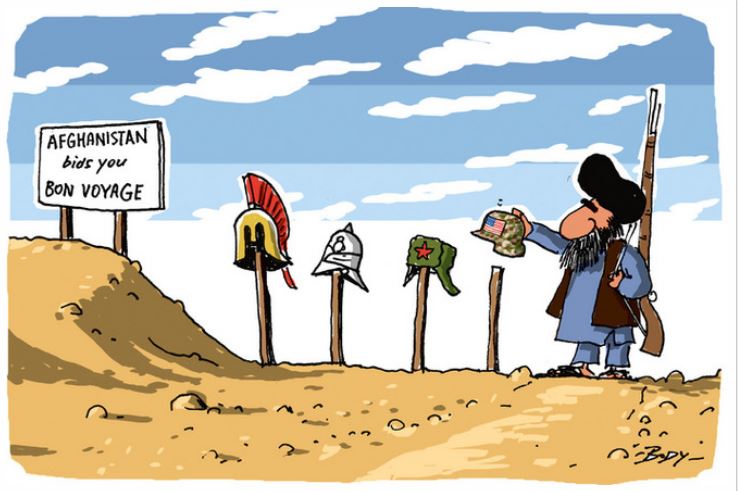For thousands of years, Afghanistan has been the "Graveyard of Empires"
ANDREA GERMANOS for Common Dreams
 |
| Cartoon by Guy Brody, New Zealand Herald (via NZ National Library) |
As the Taliban on Friday made further gains in control over territory—uprooting thousands of Afghan civilians—longtime critics of the Afghanistan war say the current situation is an "inevitable" outcome of the United States' doomed and deadly two-decade military pursuit that's cost over 2 trillion dollars and untold human death and suffering.
 |
| British Embassy staff being evacuated from Kabul by the RAF in 1928. |
Foreign policy scholar and author Phyllis Bennis, a fellow at the Institute for Policy Studies, had a similarly blunt assessment.
"I think
it's important that we recognize that this kind of a crisis was inevitable
whenever the U.S. pulled out, whether it had been 10 years ago, 19 years ago or
10 years from now, the reason being that this was rooted in the nature of the
U.S. occupation that began in 2001," she told Democracy Now! this
week.
"There was
not at that time—there is now not—a military solution to terrorism," she
said, "which was ostensibly the reason for the invasion and occupation of
Afghanistan."
Pentagon spokesperson John Kirby said Thursday
that the U.S. is sending 3,000 troops for what he asserted was a "narrowly
focused mission" to help evacuate Kabul embassy staff. The U.K. is also sending 600 troops to get its
citizens out. The U.S. military is still conducting air strikes in Afghanistan,
and the CIA is continuing its
operations in the country.
The Associated Press reported Friday
on how the Taliban has swiftly seized significant territory in Afghanistan over
the past week.
"The
Taliban completed their sweep of the country's south on Friday as they took
four more provincial capitals in a lightning offensive that is gradually
encircling Kabul, just weeks before the U.S. is set to officially end its two-decade
war," reported AP. Gains included the seizure of the
country's second and third biggest cities—Taliban birthplace Kandahar and
Herat. The Taliban now control more than two-thirds of the country.
The country's
biggest city and capital, Kabul is still under Afghan government control, but,
the New
York Times reported Friday,
insurgents are closing in on that city as well.
History shows it is easy to invade Afghanistan but almost impossible to conquer
"The speed
of the cities' collapse, combined with American officials' announcement
Thursday that they would evacuate
most of the United States Embassy, has deepened the sense of
panic across the country as thousands try to flee from the Taliban
advance," the Times reported.
It was already
precarious for civilians. The United Nations Assistance Mission in Afghanistan
(UNAMA) announced in July that civilian casualties in Afghanistan hit record
levels for the first half of 2021. The year could see the highest ever annual
number of documented civilian casualties, UNAMA added.
Addressing the
current crisis, Stéphane Dujarric, spokesperson for U.N. Secretary-General
António Guterres, expressed concern Thursday about "the shift of fighting
to urban areas, where the potential for civilian harm is even greater."
But war hawks' assertion that
President Joe Biden's troop withdrawal is to blame is false, said Benjamin
Friedman, policy director at Defense Priorities.
"The
inability of the Afghan security services to hold territory in much of
Afghanistan without U.S. assistance is not a reason to keep U.S. forces
there—it is an indictment of the project that kept U.S. forces there so
long," he said in a Monday statement.
"The state-building mission failed, and building a capable military on top
of a bad state foundation is nearly impossible."
The
deteriorating situation has also elicited comparisons to
U.S. troops leaving Vietnam in 1975, an analogy rejected as "lazy"
analysis by Stephen Miles, executive director of Win Without War.
"I would love if just one of the politicians or pundits making this argument could point to where in the historical record the fall of Saigon led to the American public reversing their course in opposition to the war in Vietnam and supporting a renewed U.S. engagement in the war," he wrote in a Thursday Twitter thread.
"Much like Afghanistan, the American public had
long since concluded that the reason to exit the war was the war's very failure
and futility."
"Like most
of America's military misadventures, no one will look back through history with
anything but shame and sorrow for the human suffering wrought and the repeated
failures of the U.S. war machine. That has long been true already of the public's
view of the U.S. Afghan war," added Miles.
According to Rep. Ro Khanna (D-Calif.)—who called the Afghanistan war "a
colossal waste of resources"—Biden was right to pull out troops.
Speaking with Democracy Now! on
Wednesday about the developing situation in Afghanistan, Khanna said that an
attempt to prevent any "Taliban control over Afghanistan... was a fool’s
errand."
As for what
needs to happen now, Khanna said, "We need to do whatever we can with the
international community and the regional community there to seek a ceasefire,
to seek peace, to do what we can to uphold human rights, recognizing that the
Taliban does violate human rights."
"We have to
do the best we can in the circumstances," he said, "and we need to do
the best we can for the civilians, including making sure that we are taking our
share of asylum seekers from the area and that we’re doing what we can to
provide water and basic necessities to the civilians through the international
organizations."